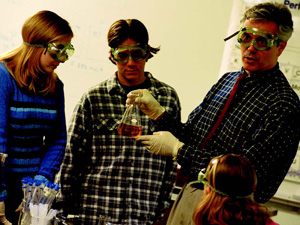Can We Trust Science?
by Dr. Dan Criswell
Have you noticed when sitting in your car at a traffic light, how many motorists in the cross traffic, or in the opposing left turn lane, continue through the intersectio n even after the traffic light has turned red? There aren’t enough traffic police to enforce the law requiring drivers to rely on voluntary obedience to the law for their safety. But who are these people that are neglecting the law? Are they hardened criminals, people late for work, soccer moms late for a game, or scientists late for a meeting?
n even after the traffic light has turned red? There aren’t enough traffic police to enforce the law requiring drivers to rely on voluntary obedience to the law for their safety. But who are these people that are neglecting the law? Are they hardened criminals, people late for work, soccer moms late for a game, or scientists late for a meeting?
In the past few weeks a prominent scientist, Woo Suk Hwang of Seoul National University in South Korea has admitted to “running a red light” in the scientific community by using methods considered unethical to science and falsifying data. Hwang published a paper with fellow researcher Gerald Schatten (University of Pittsburgh) claiming their team produced patient specific embryonic stem cells (Science 308, 2005). Patient specific embryonic stem cells are produced by injecting the patient’s DNA into a donated enucleated egg cell (ovum), a process called somatic cell nuclear transfer (see A&F Impact #380), and then allowing the cells to reproduce until reaching the blastula stage of development. These patient specific embryonic stem cells could then be developed into cell types that are needed by the patient to treat such diseases as Alzheimer’s, Parkinson’s, or diabetes, without an immune response since the cells have the patient’s DNA. This would have been a major breakthrough for embryonic stem cell research. Unfortunately, Hwang, at one time considered a pioneer in the field of embryonic stem cell research for cloning the dog “Snuppy” (Nature 436, 2005), has admitted to falsifying data that would have authenticated his claims. In fact, after independent researchers analyzed his data, and after his own admission, it is now known that Hwang did not produce any patient specific embryonic stem cells. This was particularly troubling to a scientific community that declared his achievements as some of the most significant of the past year and which encouraged his own country to pronounce him as a “National Treasure.” Not only did Hwang falsify data concerning his research, but one of his female junior researchers stated that she felt compelled to donate her own eggs for the research because earlier portions of the research had failed as a result of her efforts. Allowing or pressuring research team members to donate ova has since been banned by most countries involved in stem cell research to protect younger researchers from coercion by their superiors. Hwang’s offenses are certainly more serious than a traffic violation, and he could face criminal charges in South Korea.
The ethical problems in research are not limited to other countries either. In the U.S., Eric Poehlman of the University of Vermont is facing criminal charges for falsifying data on NIH grants, and MIT professor Van Parijs also has admitted to falsifying data in several papers and in grant applications. The ethical dilemmas of a few researchers certainly shouldn’t taint all scientists as dishonest, but should alert the public that results need to be verified before they can be accepted as fact.
We trust science. We trust that scientists have done their work well and honestly when we drive a car over a bridge, ride in an elevator, or undergo a surgical procedure. But we need to be realistic in our trust of scientists. Scientists are human with sin natures just as the rest of the human population. As Christians, when a scientific “breakthrough” is reported we should either examine the evidence for ourselves, or if we are not qualified to discern the data (which in many cases only a specialist in the field would be able to do), we should wait until the data are verified and confirmed by other reputable scientists before claiming it as fact. Unfortunately, many Christians transfer their trust in science to a scientist when he gives an opinion or hypothesis about the origins of the universe, the living world, and humans as well. Many assume that since a scientist said it, “it must be true” even if it apparently contradicts Scripture. From the recent events depicting the problems that a few scientists have had with honesty and integrity, we should remember that they are human and just as prone to sin as the rest of us. When can we fully trust scientists? Just as soon as people stop running red lights!

















